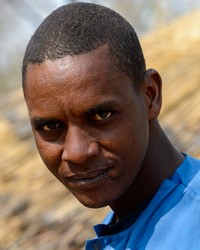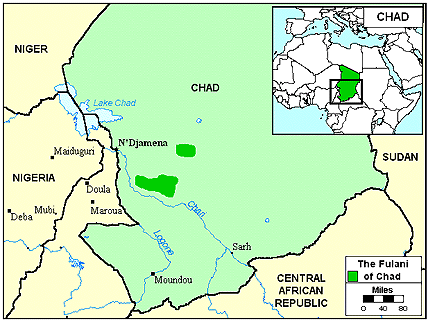In the 1800s, Modibo Adama, a scholar and Muslim holy warrior, led a jihad in what is now Cameroon and Nigeria, opening the region up to Fulani colonization. He continued his campaign, eventually conquering many villages and founding his own empire, which he named Adamawa after himself. His Fulani people established Islam as the religion in the region. New converts learned classical Arabic in order to study the Koran. To support themselves, the people raised cattle on land that was once forested.
In general, the Fulani peoples are located in an almost horizontal strip across West Africa. The Sahara Desert forms their northernmost boundary, while the threat of tsetse flies controls their movement to the south. The Fulani tribes are grouped and named according to their locations, occupations, and dialects. The Adamawa Fulani are the group of Fulani who live in Nigeria's Adamawa Province. Some live in Cameroon, Chad, Gabon, and Sudan. There are also a small number in Cape Verde.
A true Adamawa Fulani is psychologically and physically distant and distinct from a non-Fulani. He will control his emotions so that no one knows what he is thinking. The ideal Adamawa Fulani is reserved. He is gentle, yet disdainful toward non-Fulani. Though some Adamawa are now scholars and Muslim leaders, most are rural. Although the majority are shepherds, some are farmers who grow sorghum or corn. Usually they obtain millet, yams, and peanuts by trading with nearby tribes. Milk is a main source of the Adamawa Fulani diet, and the people also produce and trade butter in the markets.
Adamawa Fulani have dry-season and wet-season camps. They live in the wet-season camps during cultivation and harvest times, when the pastures are best for grazing. Their homes are beehive-shaped huts made of woven twigs, leaves and grass. During the dry season, the people camp in portable huts, moving the cattle or sheep herds to well-watered land in the flood plains. Men hunt, trade livestock, and are in charge of herding. Women usually milk the cows and sell butter. Young men move the herds with the help of their younger brothers. Elders make all political decisions and teach traditions to the children. Children learn from an early age to have the dignity and pride that all Adamawa Fulani seem to possess.
Adamawa Fulani boys are initiated into manhood in an unusual manner. Friends must beat each other across the chests with walking sticks. They are not allowed to show signs of pain and the boy will proudly show his scars as a sign of courage throughout his life. A boy who has been initiated into manhood will live in a separate hut which eventually will be the home for his fiancé. Marriages usually are arranged by parents during a child's infancy. According to Muslim tradition, men may marry up to four wives. Adamawa Fulani believe a person lives from generation to generation through his children. If an Adamawa Fulani dies having never had children, his community views him as having died twice. For that reason, children are extremely important to the Adamawa Fulani.
The great majority of the Adamawa Fulani are Muslim; however, like other Fulani groups, the Adamawa Fulani adhere to traditional practices and beliefs as well. For example, taboos are common in their culture: they may not call a first son or daughter by name; a wife is to be seen at a distance from her husband in public; they may not eat goat meat. Adamawa Fulani are required to love their mothers and respect their elders. They possess many virtues, such as generosity, honesty and modesty.
Pride is a huge barrier to the gospel, which much be accepted like a humble child. The Adamawa Fulani need the humility to understand and act upon the belief that they need a sin-forgiving Savior.
Pray for the Lord to humble Adamawa Fulani leaders and lead them to humble devotion to Christ.
Pray for the Lord to provide for the Adamawa Fulani's livestock so well that they acknowledge his goodness and power.
Pray for a just peace between herders and farmers in Chad. There are sometimes violent conflicts over water and land.
Pray for the Lord to intervene among the Adamawa Fulani in Chad in such a way that they will become open to accepting the lordship of Christ.
Pray for workers to go to the Adamawa Fulani in Chad.
Pray for a disciple making movement among the Adamawa that will spread to other Fulani groups.
Scripture Prayers for the Fulani, Adamawa in Chad.
| Profile Source: Joshua Project |











